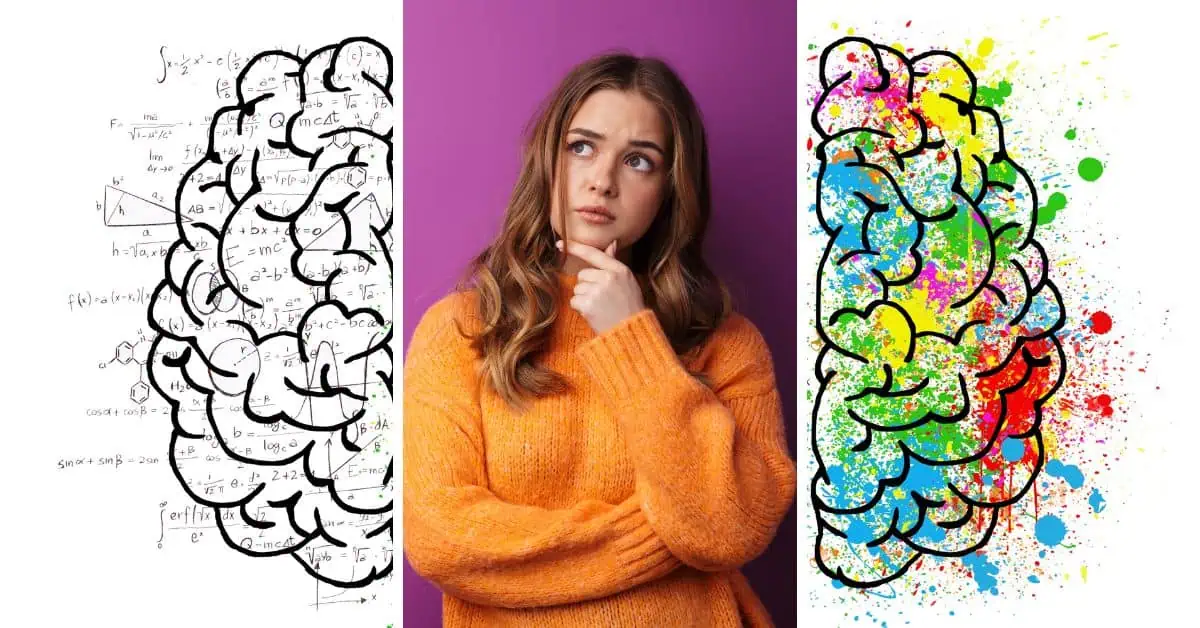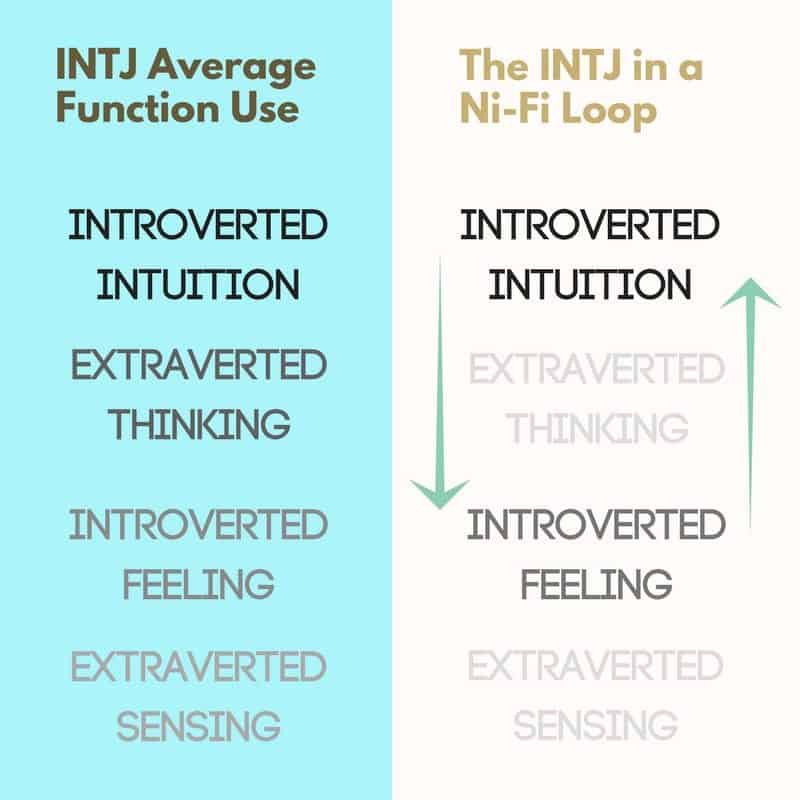Can Your Myers-Briggs® Personality Type Change?
Can your Myers-Briggs (MBTI®) personality type change? This is a question I get asked every day as an MBTI® practitioner. I come across people who say “I used to be an INFP, but now I’m an INFJ” or “I’m both an ISFP and an ESFP.” Is this possible? Can you change types or be two types? Let’s find out!
Not sure what your personality type is? Take our new personality questionnaire here. Or you can take the official MBTI® here.

This article contains affiliate links. If you purchase an eBook from one of my links I get a small percentage back to help run my site.
Table of contents
- Can Your Myers-Briggs® Personality Type Change Over Time?
- Age and Your Cognitive Function Stack
- How Age Impacts Your Perceived Personality
- How Life Experience Impacts Your Personality
- How Dominant-Tertiary Loops Impact Your Perceived Personality
- What’s an attitude?
- Why Do We Want to Enter Loops?
- The Downside of the Loop:
- The Tertiary Function and Mistyping
- The Judging/Perceiving Problem
- Wrapping It Up…
- What are your thoughts?
- References:
Estimated reading time: 12 minutes
Can Your Myers-Briggs® Personality Type Change Over Time?
According to Myers-Briggs theory, your personality type is inborn, and it doesn’t change. However, the way you exhibit your type WILL change (and should) as you go through life. Why? As you age and mature you develop different facets of your personality type.
Age and Your Cognitive Function Stack
Every personality type has a cognitive function stack. Think of this stack like a set of mental tools that you’ve been using your whole life without even realizing it.
For example, if you’re an INFJ you’re dominant function is Introverted Intuition. This is your favorite “tool” and what has guided you in making insights, strategies, and predictions your whole life. It’s the reason that it’s easy for you to sense how things will unfold, to read between the lines, and gauge deeper meanings. You may not consciously have realized you’re using Introverted Intuition for these things, but it’s become a pattern in your way of thinking that’s grown and matured over time.
So we all have this set of cognitive functions: some we feel more certainty and confidence with, and others make us feel more uncertain and vulnerable.
You can find out more about the cognitive functions (and your specific stack) here: The Cognitive Functions of Every Myers-Briggs Personality Type
To further explain, let’s use the example of an INTJ. Here is the INTJ function stack:

INTJ Primary Function Stack
Dominant Function: Introverted Intuition (Ni)
Auxiliary Function: Extraverted Thinking (Te)
Tertiary Function: Introverted Feeling (Fi)
Inferior Function: Extraverted Sensing (Se)
When I took my MBTI® certification course I learned that the functions in our type mature at different periods of our lives. From birth to about age 7, the dominant function develops. So a very young INTJ would be wholly immersed in developing introverted intuition. We might not see much thinking, feeling, or sensing at a young age (although they would still be in use, just underdeveloped).
From 7 to age 20, the auxiliary function develops (as the dominant function continues developing). So at this age, we would see thinking start to develop more. The INTJ would become more logical with their intuitions, more decisive, more no-nonsense and structured.
During the 20s, 30s, and 40s, the tertiary function develops (as the dominant and auxiliary function continue developing). The INTJ would now start to become more concerned with discovering their individual ethics and personal values. They’ve been influenced by this sensitive function before, but they probably felt awkward or dismissive of it.
During the 50s, 60s and onward the inferior function (extraverted sensing) develops as the other functions continue developing. The INTJ would now be more tuned into the present, more detail-oriented, fonder of living in the moment and taking advantage of current opportunities.
How Age Impacts Your Perceived Personality
When I was doing my training to become an MBTI® practitioner, we were taught about how the different functions in our personality type evolve and grow throughout life.
If you are an introvert (like the INTJ we just discussed), you might feel more extroverted as you develop Extraverted Thinking or Extraverted Sensing. In turn, if you’re an extrovert, you might feel more introverted as you develop your introverted functions. If you’re a sensor you might feel more connected to intuition as you develop intuition. In contrast, if you’re intuitive you might feel more connected to sensing as you develop sensing. If you’re a thinker you might feel very in tune with feeling as that function develops, and vice versa.
So you may “feel” like a different type at different ages as you develop the lower functions in your stack. All the same, your dominant function will still be your dominant. No other function will have quite as much conscious power as that function. In the same way, your inferior will remain inferior, your auxiliary will remain in the support role, and your tertiary will remain the third-most potent function in your stack.
Here’s another example in case it’s still confusing. This time, we’ll use the ESFP as an example. Here is their primary function stack:
The ESFP Cognitive Functions:
Dominant Function: Extraverted Sensing (Se)
Auxiliary Function: Introverted Feeling (Fi)
Tertiary Function: Extraverted Thinking (Te)
Inferior Function: Introverted Intuition (Ni)
Let’s imagine that we’re working with a 35-year-old ESFP. At this point in his life, he’s developing Extraverted Thinking, because that’s his tertiary function. He takes the Myers-Briggs® test and shows a strong preference for thinking because he’s really delving into that function right now. In fact, he gets an ENTJ type result. But when he reads the type descriptions he also feels a strong connection to the ESFP type. Which one is he? Is he a thinking type? Or is he an ESFP? Is he both? After more research, he realizes he identifies more with ESFP. But in order to do that, he had to look at his whole life story rather than just the moment he was in right now.
Confusion like this happens a lot, and it’s one of the reasons why learning about the cognitive functions is so important. If you know which functions you identify with and rely on more, then that will help you to define your type much more accurately than a simple test will.
How Life Experience Impacts Your Personality
Your life experiences also influence how your personality type develops. For example, if you’re a woman with a thinking preference, but you’ve spent your entire life being socially conditioned to have feeling qualities, you might have developed your feeling side because you felt pressured to due to societal expectations.
As another example, if you’re a Feeling type but your job requires you to focus on a lot of metrics, structure, and logical analysis, you might have developed your thinking side more than the average Feeling type.
How Dominant-Tertiary Loops Impact Your Perceived Personality
Dominant-tertiary loops occur when we bypass our auxiliary function and loop back and forth between our dominant and tertiary functions. There’s a strong temptation for all of us to enter these loops because if we’re introverted, the loop is introverted, and if we’re extroverted, the loop is extroverted. So it feels easy and comfortable to be in a loop.

What’s an attitude?
If you’re an introvert, your dominant and tertiary functions will be introverted.
If you’re an extravert, your dominant and tertiary functions will be extraverted.
Extraversion and introversion are attitudes. One’s energy flows inward (introversion), and the other’s energy flows outward (extraversion).
Why Do We Want to Enter Loops?
If you’re an introvert, you’ll always gain the most energy from remaining in the introverted attitude. If you’re an extravert, you’ll always gain the most energy from remaining in the extraverted attitude. The auxiliary and inferior functions can drain us sometimes because they have a different attitude than we prefer. For example, as an INTJ I often feel tempted to immerse myself wholly in intuition and feeling, because they’re both introverted for me (INTJs have introverted intuition and introverted feeling). Sometimes I don’t feel like embracing Extraverted Thinking (my auxiliary function) because it’s in my non-preferred attitude and doesn’t feel as “me” as intuition and thinking do. So if I get stuck in an intuition-feeling loop I might test as INFP or INFJ instead of INTJ. Or I might decide that I’m an INTJ and an INFJ (I’ve seen people do this).
But am I really two types? No. I’m just bypassing my auxiliary function and looping back and forth between intuition and feeling. Usually, this results in stunted development and warped perspectives. Why? Because if I stay in an introverted loop I’m not balancing my heady intuitive perceptions with real-world experiences, facts, and concrete details. So my insights become more and more detached from reality.
We need to develop both our introverted and extraverted functions, and when we don’t, we end up skewing our perspective of the world around us.
The Downside of the Loop:
Extraverts in an extraverted loop become too hasty, too wrapped up in acting, doing, and interacting without reflecting and considering. Introverts in an introverted loop become too stuck in their own subjective world; they lose track of an objective focus, real-world experiences, or taking action on their ideas and perspectives.
The Tertiary Function and Mistyping
One of the other common reasons that people can identify with two types or mistype themselves is that they are drawn to their tertiary function. Most of us enjoy using our tertiary function; in fact, that’s why it’s called the “relief” function. The tertiary function provides relief and is a way that we tend to be creative and playful. This is why psychologist John Beebe called the tertiary function “the eternal child.” We often identify with the tertiary function in a deep way because it is in our preferred attitude (if we’re introverted, it’s introverted, etc,.) and also because we tend to get joy out of tinkering and engaging with this function in daily life.
For this reason, I see may ISXPs type as INJs. ISPs have tertiary introverted intuition so many times they will type as INTJs and INFJs instead of ISPs. I also see ESJs mistype as intuitives because they are developing intuition as their tertiary function and are therefore drawn to some intuitive ways of thinking. Sometimes INPs can mistype as ISJs when they’re developing introverted sensing.
In mid-life especially, many individuals can mistype as they develop their tertiary function. EFPs might type as ETJs, ENJs might type as ESPs, etc,.
Your tertiary function holds a lot of appeal in mid-life. You can find out what your tertiary function is here.
So if you’re unsure of your type, think about which function comes the most naturally, without even having to try. The tertiary function is fun and creative and playful, but it doesn’t function as smoothly and effortlessly as the dominant function does. It takes more conscious work to master.
The dominant function is the function you’ve lived and breathed for most of your life without having to really try. It’s the function that “leads the charge” when life feels chaotic; it’s steady, trusted, dependable, and easy to use in a consistent way.
The Judging/Perceiving Problem
Many, MANY introverts get mistyped because of the confusion over the J/P preference. The J/P preference tells us how we are oriented to the outer world, not how we are oriented internally.
Most descriptions of judging types will be relatable to EJ types, but less so to IJ types. In the same way, most descriptions of perceivers will be relatable to EP types, but less so to IP types.
Why is this?
IJ types have a dominant perceiving function. They are most content and most able to enter a “flow” state when they are in a mode of perception, not judgment (decision-making). IJ types can be surprisingly slow to make decisions, and they may prefer to leave things open-ended and ponder rather than act, decide, and organize. But because IJ types have an extraverted judging function, they are listed as “J”‘s because their first extraverted function is one of judgment, not perception.
If you’re confused you can read more about this here.
IP types also can mistype as IJ types because IP types (INFPs, ISFPs, INTPs, ISTPs) have a dominant judging function. Inwardly they might be much more decisive, firm on their opinions, and organized than they seem outwardly. But because their first extraverted function is one of perception, they are labeled as “P” types.
So it’s very common for IJ types to relate more to perceiver descriptions and IP types to relate to judging descriptions.
As Dr. AJ Drenth from Personality Junkie says, “IPs are a mix of J-P characteristics. Since their dominant function is a Judging function (Ti or Fi), they are inner Judgers. IPs are far more serious inwardly than they appear outwardly. Rather than remaining open to new information like healthy EPs, they feel driven to move toward closure and to have things settled in their minds like EJs. “
And in describing IJs, Drenth says: “IJs are also a mix of J-P characteristics. Outwardly, they look like Judgers. They can be assertive and opinionated, even resembling EJ types. But since their dominant function is a Perceiving function (Ni or Si), they are inner Perceivers. Indeed, they are dominant Perceivers. So in reality, IJs are far less serious, closed, or judgmental than they may appear outwardly.”
Wrapping It Up…
As you can see, there are a number of reasons that we can become mistyped or confused about which personality type is the best fit. But keep in mind that you do have just one personality type, but with many facets and dimensions that give you depth and variety. That’s a good thing! If you’re an ESTJ, for example, you still use intuition and feeling. If you’re an INFJ you still have perceiving and extroverted functions. Knowing the complexity of type helps us to appreciate the complexity of each individual we meet along the way!
What are your thoughts?
Has this been helpful? Has it confused you even more? Do you have any thoughts you’d like to add? Let us know in the comments! Find out more about your personality type in our eBook, Discovering You: Unlocking the Power of Personality Type.
References:
Are Personalities Permanent? Can Your Personality Type Change
MBTI® Manual – A Guide to the Development and Use of the Myers-Briggs Type Indicator® Instrument (CPP, Inc., 2009)
Rethinking Judging and Perceiving in Introverts – Personality Junkie

Other Articles You Might Enjoy:
Can Childhood Trauma Impact Your Personality Type?
Are Feelers More Emotional Than Thinkers?
Are Certain Personality Types Smarter Than Others?
A Beginner’s Guide to Identifying Someone’s Myers-Briggs® Personality Type












I do not agree that MBTI does not change. I think major life events can move a person from E to I. I believe I was extroverted as a child. I became disabled as a young woman and there is no doubt I am now introverted. I retain my enjoyment of small social groups but dread the type of social interaction I once found to recharge me. My journey into disability and chronic illness also pushed me further into feeling and intuition as sensation shifted to pain and data and logical thought failed me.Adult development, alone, does not account for this shift.
This was a very interesting and helpful article! I’ve had people tell me that their type changed, and I’m pretty sure that they’re just confused, but I don’t know how to explain it.
I know that ESFJs have dominant extraverted feeling and auxiliary introverted sensing, but could you tell me what our tertiary and inferior functions are? That’s really the only thing that confuses me.
And congratulations on your new baby! (I’m on your email list;)
Hi! ESFJs have tertiary extraverted intuition and inferior introverted thinking. I’m so glad you enjoyed the article – and thanks for being part of my email list!
Thank you!
My type has changed over time, as I’ve become increasingly introverted the older I get. Back in high school psych, I typed as ESTJ, but I was VERY close to the center on the continuum between E and I. After the end of my disastrous marriage, I tested again and this time fell just barely on the opposite side of the continuum, showing a slight preference for I. I tested yet again last year in a class — over 25 years since my first test — and had shifted far away from the center, to a marked preference for introversion.
This is a great explanation. In workshops I explain this at a simpler level, but I love this in-depth look. I foresee a new slide about development in my teaching decks.
In regards to Anonymous above, the assessment is not meant to be administered to high school aged people because of their stage of development at the time. Also, if someone without proper training in how to administer the assessment and interpret the results gave you the assessment, your results will be flawed. For one thing, the indications of Slight, Moderate, Clear, or Very Clear or not indicators of how much. They only indicate the clarity of the result in your assessment answers.
Thanks for writing and sharing this with everyone. I’ve been trying to figure this out for a few weeks now. When I was younger I was also identified as an INFJ and very much identified with every word of the description and still do! But recently like I you, I’ve been testing as either and INTJ or and INFP. It’s been very confusing because when I read those descriptions it’s like they’re talking about a stranger that I don’t recognize but then again I haven’t been my normal self in a while because of a lot of circumstances.
I think a change in confidence can make it look like one’s type has changed. I always typed as an introvert when I was younger, but there was always a desire in me to live more in the outside world, I just lacked the confidence to do so. In the last several years, I have matured and been put in situations that have made me more confident in who I am and my abilities. Both people and tests type me as an extrovert now.
Do you think that the S/N and T/F can change in one’s personality type? Also, I’m an INFP but lately I’ve typed as different Extraverted types…?
it is NOT true that the type can’t change.
Because of 3 reasons.
1.) It is DIMENSIONAL. That means that no one is 100 percent one type. It is a tendency. For instance I am about 78% I, 86% N, 74% T and 89% P.
2.) The population is distributed in a gauß-shape in each dimension, meaning that most people have a rather small tendency in some dimensions (closer to 50%)) and maybe stronger tendency in other dimensions (farther from 50% though with decreasing likelihood towards 100%). This has already been shown in studies for the first dimension introverted-extraverted: there are many ambiverts.
3.) As in most cases it is both: nature and nurture. I estimate that we have about 30% room to move, so about 15% in one direction (say introverted) and 15% to the other (say extraverted), depending on the circumstances. But our personal zero point is given genetically. For instance let’s suppose my zero point for the first dimension is the actual 74% (you can’t really know, just estimate). So I could possibly change to states between 74+15=89% thinking to 74-15=59% thinking.
Deriving from 2 and 3: depending on the personal given zero point in each dimension (which is for most people distributed around 50% of some of the 4 dimensions because of the gauß-shape) and the pulling factors from our surrounding, it is POSSIBLE to change type – within approximately 30% of latitude. For instance a maximum change from 65% introverted to 65% extraverted is possible, though less likely than a change from 53% introverted to 53% percent extraverted. A change from 70% thinking to 70% feeling is not possible (that would be 40% difference).
No, typing by letters is unreliable and confusing. It is much better to study the cognitive functions, like the author suggests in this article.
THANK YOU for writing this article! I have been hurt and confused this year as I try to regain some personal space for myself in relationships and my life, but I keep getting confused by sensing that I’m picking up on now (I am 32). My family decided to try a new test on another site for fun recently and whan I got my results I came up with sensing instead of intuitive as I’d done in years past. I actually had family members take the test for me, thinking stress was leading me astray, but results came up as sensory on my test results for them as well! THEN, because I was getting panicky at this point, I waited a few days and took a test on another site…and came up with ESFJ for a 4th time!! Crazy! I have identified as ENFJ up to this point however. So thank you for explaining everything here so thoroughly! It all makes sense now.
How would your personality be represented better by your family members
This is a very interesting articles which summarizes well the different instances in which types can seem to change but actually doesn’t. I’ve just read an article which gives an examples for ENFPs who often feel like they’re INFP, how that can be, etc. Pretty interesting study case, I’ll share it https://ennpey.com/am-i-an-enfp-or-an-infp-changing-types-over-a-lifetime/
Thank you for the article!
Some months ago I mistyped myself but after I made some inner research I found out that I just don’t want to act like my type because I didn’t like it. Now then my friends mistype theirselves I advice them to do some kind of ‘bingo’ (sorry don’t know how you call it in english) because these show some most typical options and behaviors of each personality type and one can clearly see which type is theirs.
Thank you once more! 🥰
Thank you for the article, I feel like I understand my changes better. I’m ESTJ (in my 30’s), and within the past couple of years I’ve wondered if I wasn’t an F or a P at times. This makes so much sense, thank you!
The first time I did the MBTI test which was 4 years ago I got an ISTJ, but then I started getting INFP and i keep getting INFJ. So I am confused if I am INFJ or INFP at this point.
Tertiary function develops from 20 years? What if I’m a teenager and most likely in a loop?
In general, please tell me what does “develop” mean? So we use all the functions from birth? And only 1\2 prevail? To develop = differentiate as something separate to this “prevail state”? Or how? I did not understand this. Thanks in advance.
Thank you for your fascinating article. In my teens I tested as ESTJ. Now that I’m middle age, I tested as ENTJ. My dominant/inferior functions never changed yet Aux-Si swapped with Ni and Ter-Ne with Se. (Fi/Fe remained under the rug and in the shadows–now that’s funny.)
As interesting as this article might be, the only source cited (formally or informally) is someone associated with this blog. No studies. No journals. No experts that aren’t associated with the blog. Even the MBTI website isn’t truly cited here. I don’t know if the concepts here are supported. An undergrad personality psych course only covers the basics of MBTI and I haven’t scoured the internet to find the evidence myself. However, I’d take what’s written here with a grain of salt. Do your own research and find more reliable sources to support these ideas. Don’t take it as “the truth” just because someone claiming to be an expert on the internet said it. Just a word of advice to anyone reading the comment section.
Hi Kel! Thanks for this comment. Reading it was a good wake-up call for me to add some sources to the material. Most of this information was taught to me in my training to become an MBTI practitioner. However, I did add in some sources after reading your comment so that others can see some further information on this.
I wonder if there’s a type of masking that might go on.
If you were in an environment where certain behaviors were expected of you might you identify those as preferences when they were really just your expression of meeting social expectations.
If that were true, you might appear to be one type and might only find your true type when you escaped the environment or were given a new perspective within it.
Thank you Susan, this is very clear. Female ENTP here.
I originally typed (in my twenties) as a Feeler and I can now see this was because my tertiary function (Fe) was developing and I was paying more attention to it!
Unbeknownst, I was caught in a loop between my dominant and tertiary functions (Ne and Fe) for a couple of decades! I dismissed my Introverted Thinking (Ti) as a ‘play function’ because, quite frankly, it’s hard work and I don’t get kudos for it! Extraverted Feeling on the other hand gets a lot of social rewards. I have typed as an INFJ, then an ENFJ. It’s only when I really started to pay attention to my inner mind workings that I realised neither Introverted Intuition nor Extraverted Feeling are the ‘seas I swim in’ – it was Extraverted Intuition all along.
It’s freeing to discover one’s best fit type, and develop all one’s functions according to their place in one’s cognitive stack.
Can emotional abuse or trauma affect how the types functiom?
It absolutely can! I wrote an article about childhood family dysfunction and how that can make an impact here: https://www.psychologyjunkie.com/family-dysfunction-and-personality-type/
I hope this helps!
Just confirmed again that I am ENTJ by taking the MBTI step II and online type verification by a practitioner. One question: I am almost 42, but still underdeveloped (or unsure) about my Se. I even feel more comfortable about my Fi than Se. Is it common for people to neglect their tertiary function? I am confident about my Si trickster and Fe demon. Te dominant and Ni auxiliary fit as well. Fi aspirational is abundant too. I just do not derive that much pleasure from a so-called relief function that is Se.
This was so interesting and helpful. I’m a teenager infp who’s been really interested in MBTI for the past 2 years. But there are a lot of stuff that I still don’t understand or find contradicting. This article clarified much issues I am currently facing with MBTI, thank you so much. I actually have a older sister that I’m 100% sure that she’s an ENFP based on cognitive function but she’s always typed as an ENFJ and that made me very confused. I thought that maybe I was forcing my opinion on her behaviour? But ENFP description fits her too well and only recently she started to be more organised and structured. From this article, I understand that it is because she is in her 20s. I love learning more about MBTI and always feel impressed of how accurate it is.
I read all of your articles but never comment, so I take this opportunity to say that they are very qualitative and helpful and easy to understand as English is not my mother tongue 🙂